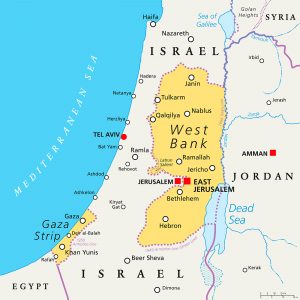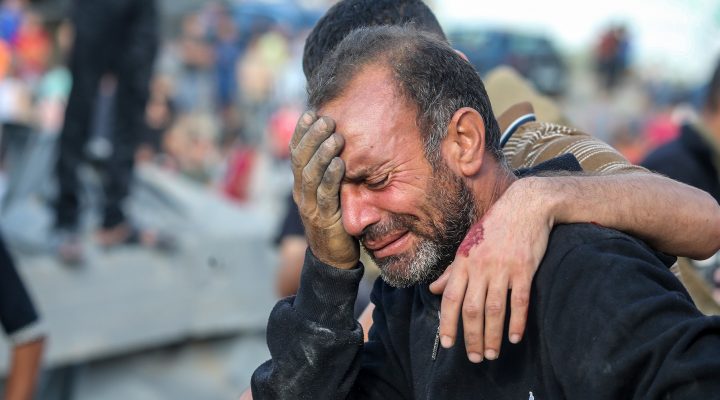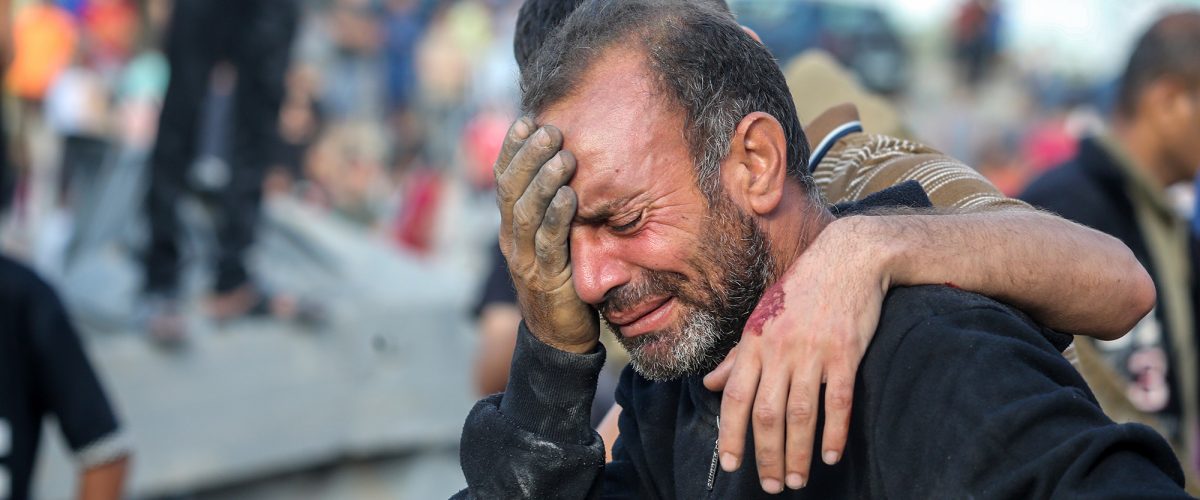A week ago, I sat with a Palestinian shopkeeper in a country bordering Israel, drinking tea and watching nonstop Arab TV coverage of Israel’s retaliatory pounding of Gaza.
Gazans ran in panic. Rescue workers screamed for ambulances and pulled dust-covered bodies from rubble. Reporters on the scene talked in urgent tones about the defenseless victims of Israel’s assaults, cutting away periodically to show Israeli tanks lining up at the border.
“See that?” my new friend asked, pointing toward the Israeli rockets slamming into buildings in Gaza. “The difference between us and the Israelis is that we don’t kill civilians.”
Such is the willful blindness of the aggrieved.
Had he not seen or heard of the savage Hamas attack on civilians in southern Israel only a few days before? Had he not seen or heard of the videos — on gleeful Hamas social media posts if not Arab news channels — of Hamas fighters shooting hundreds of unarmed Israelis, raping and torturing Israeli women, burning children alive and dragging terrified hostages back into Gaza?
I didn’t bother to ask him. Attempts at rational conversation are pointless amid such events, particularly on the “Arab street,” particularly in countries hosting populations that trace their origins back to Palestine.
Conversation wasn’t much more rational in the West, where I returned home to see demonstrations celebrating Hamas’ butchery, read reports of attacks and threats against Jews in Europe and America, and listen to leftist apologists insist that it’s all Israel’s fault.
Generations of homelessness
I don’t blame average Palestinians — whether they live in Gaza, the West Bank or neighboring countries — for what is now unfolding. They have endured generations of statelessness since the creation of modern Israel — not that they had much of a state during four centuries of Ottoman Turk rule or the early 20th-century British Mandate in Palestine.
Palestinians have suffered humiliation, oppression and second-class citizenship — not just at the hands of the Israelis but of the surrounding Arab states that have mostly refused them permanent residence (Jordan being the one notable exception), used them as pawns against the Israelis and cynically fueled their fantasies of a glorious Palestinian state rising from the ashes of Israel.
“If Gaza is an ‘open-air prison,’ as Palestinian advocates like to say, then Egypt is the co-jailer along with Israel.”
The Arab states’ refusal to open their doors to Palestinians persists to this day. If Gaza is an “open-air prison,” as Palestinian advocates like to say, then Egypt is the co-jailer along with Israel. Even as Israel warned 1 million Palestinians to evacuate Gaza City and go south as it prepared for a ground invasion, Egypt refused to open its Rafah crossing with Gaza to fleeing Palestinians.
“This is the cause of all causes, the cause of all Arabs,” intoned Egypt’s president, Abdel Fattah al-Sisi, Oct. 12. “It is important that the (Palestinian) people remain steadfast and present on their land” — in other words, sitting ducks in the shooting war between Israeli forces and Hamas.

(123rf.com)
In reality, the Egyptians and other neighboring states don’t want to deal with a large influx of Palestinians. And they fear the radical Islamist influence of Hamas, which emerged from the Muslim Brotherhood, born (but now banned and violently suppressed) in Egypt.
Then there are Palestinian leaders, starting with the late Yasser Arafat and the Palestinian Liberation Organization, who never have shied from sacrificing their own people on the mystical altar of statehood.
They ultimately rejected the best deal they were going to get after the first Palestinian Intifada (uprising), which pressured Israel to negotiate with the Palestinians in earnest. The Oslo Accords of 1993 and 1995, signed by Israel and the PLO, recognized the Palestinians’ right to self-determination and accepted the establishment of the Palestinian National Authority over Gaza and the West Bank.
Further talks were supposed to deal with the thorny issues of the status of Jerusalem, Israeli settlements in Palestinian areas and the “right of return” for displaced Palestinians to their former homes in Israel.
Those talks bogged down, undermined by extremists and rejectionists on both sides and the assassination of Israeli Prime Minister Yizhak Rabin by an ultranationalist Israeli in 1995. U.S. President Bill Clinton’s marathon — but failed — effort to broker a final settlement at Camp David in 2000 saw Arafat and Israeli leader Ehud Barak walk away from a deal. The Second (and more bloody) Intifada followed, and realistic hopes of a two-state solution have been fading ever since.
Fast forward
The Palestinians in the West Bank have been governed, more or less, for nearly two decades by Arafat’s successor, Mahmoud Abbas, 87, president of the weak and corrupt Palestinian Authority. He keeps finding excuses to delay elections in the area, which he almost certainly would lose. But the Palestinian Authority cooperates (opponents would say collaborates) with the Israelis to maintain relative stability.
The West Bank is an unpleasant, unjust place to live, but it’s a garden spot compared to Gaza, where 2.3 million Palestinians struggle to survive under the boot of Hamas. A radically Islamist, Jew-hating terrorist group, Hamas has refused from its beginning in 1987 even to negotiate with Israel, which it pledges to destroy. Hamas violently seized control of Gaza from the Palestinian Authority in 2007 after Israel withdrew in 2005 and has ruled by force there ever since. In late July, thousands of Palestinians took to the streets across Gaza to protest harsh living conditions and burn Hamas flags. Their demonstrations were quickly crushed.
“Israel’s leadership, meanwhile, has descended from the statesmanship of Yitzhak Rabin to the sleaziness of Benjamin Netanyahu, the worst leader in the nation’s modern history.”
Israel’s leadership, meanwhile, has descended from the statesmanship of Yitzhak Rabin to the sleaziness of Benjamin Netanyahu, the worst leader in the nation’s modern history. Netanyahu belongs in a jail cell for his rampant corruption, not the prime minister’s chair. Yet he has capitalized on his political skills — and Israeli political and religious divisions — to become Israel’s longest-running leader.
Netanyahu’s latest government is a motley coalition of right-wingers, ultra-Orthodox religious extremists and open racists. When they aren’t undermining Israel’s democracy and independent judiciary and dividing Israelis against each other, they’re threatening annexation of the West Bank and relentlessly expanding Israeli settlements there. The Netanyahu government’s arrogance and complacency, and its focus on sending Israeli forces to support settlements and quell unrest in the West Bank, undoubtedly contributed to the virtually undefended southern border that was easily breached by Hamas attackers Oct. 7.
“The current Israeli government bears especially great responsibility for the debacle, having taken its eye off the ball due to two domestic preoccupations of its own making,” writes global analyst Ian Bremmer.
“First, Israel’s domestic political crisis, caused by Netanyahu’s insistence on a controversial judicial reform despite unprecedented mass opposition, had an impact on Israel’s national security readiness. The government ignored and even ridiculed repeated warnings from the IDF (Israeli Defense Force) that the far-right coalition’s polarizing assault on institutions was eroding social cohesion, fueling public distrust in the government, and undermining the military’s readiness.
“Second, the coalition’s hardline annexation policies and coddling of Jewish extremists fueled settler violence against Palestinians in the West Bank (which in turn provoked Palestinian retaliation) and led the government to deploy most of the regular IDF forces to that sector. As recently as (early October), the IDF transferred three battalions from Gaza to the West Bank to reinforce the troops there over the Sukkot holiday weekend. This left the Gaza border lightly guarded, creating favorable operational conditions for Hamas to pull off its attack.”
What comes next?
One of the few bright spots in this unfolding tragedy may be the end of Netanyahu’s long reign, but his bitter and divisive legacy will take a long time to overcome.
For now, however, a bloodied but determined Israel will focus on a task it should have accomplished years ago: destroying Hamas. It will involve street-to-street, house-to-house and tunnel-to-tunnel fighting in Gaza and the loss of thousands of innocent Palestinian lives along with the Hamas murderers who hide among them. Many Israeli troops also will die, and I doubt Hamas will spare any of the more than 150 Israeli men, women and children they hold as hostages.
The Israeli military campaign already has raised legitimate international cries of human rights violations, especially as Israelis push more than 1 million Palestinians south in preparation for a ground assault on Hamas in Gaza City. Those cries will grow louder as the invasion proceeds.
Why did Hamas pick this moment for its cowardly attack on Israelis? Probably because most of the world — even the Arab world — has grown weary of the never-ending Palestinian melodrama. Multiple Arab states, including Saudi Arabia, are moving toward normalization and eventual peace agreements with Israel, finally acknowledging political reality and pursuing greater economic ties.
“An increasingly desperate Hamas likely saw an opportunity to sabotage the regional movement toward normalization.”
An increasingly desperate Hamas likely saw an opportunity to sabotage the regional movement toward normalization. Their primary patron, Iran, the bitter enemy of both Israel and Saudi Arabia, certainly supports that goal.
What comes next? Blood.
After that, maybe, just maybe, wounded Israelis and Palestinians will sit down together once again — minus the rejectionsists and extremists on both sides who have poisoned past talks — and search for a way forward. I doubt it will involve a two-state solution; that ship probably has sailed. But perhaps it will include the restoration of Palestinian Authority control in Gaza, a new effort to respect the human dignity and basic freedoms of Palestinians throughout Gaza and the West Bank, the end of new Israeli settlements and the end, once and for all, of Palestinian attacks on Israel and its right to exist.
Regardless of where you stand on secular Zionism or prophecies about the restoration of biblical Israel and the end times, modern Israel exists primarily because the Nazis and their many collaborators tried to destroy European Jewry — and almost succeeded. Fascism and Jew hatred are rising once again across Europe and elsewhere.
If “never again” is to be more than a banal phrase in the modern world, Israel must endure as a Jewish state and homeland, and its opponents must be defeated.
May it be a better, more just, more humane Israel. But it must endure.

Erich Bridges
Erich Bridges, a Baptist journalist for more than 40 years, has covered international stories and trends in many countries. He lives in Richmond, Va.
Related articles:
Holding two truths together | Opinion by George Mason
‘I’m a Palestinian American Christian, and I don’t hear my story in any of the narratives’ | Opinion by Ghassan J. Tarazi
‘Two-state solution’ was deemed less likely even before the current war between Israel and Hamas
My heart and my mind are in conflict about Israel and Hamas | Analysis by Rodney Kennedy
Violence begets violence: Hamas’ Pyrrhic victory | Opinion by Raouf J. Halaby


